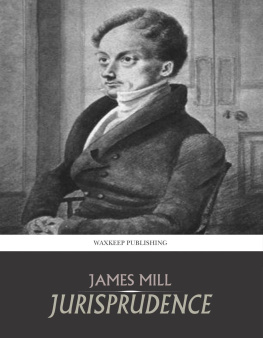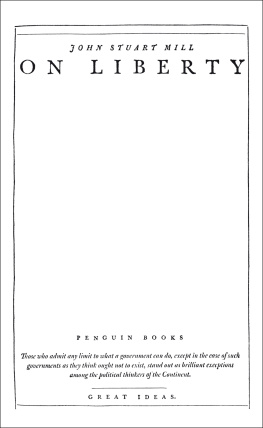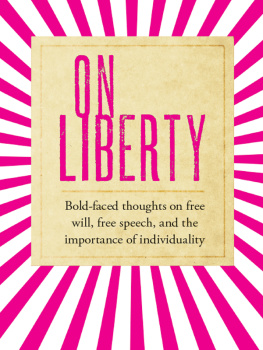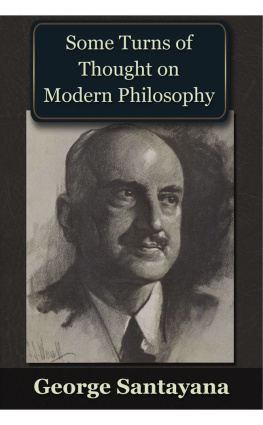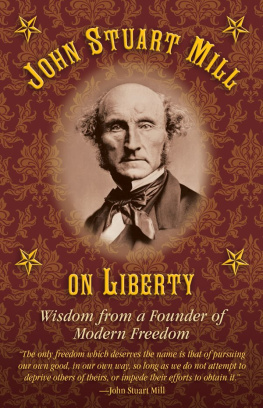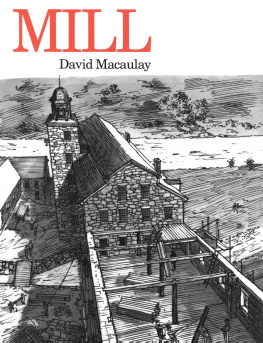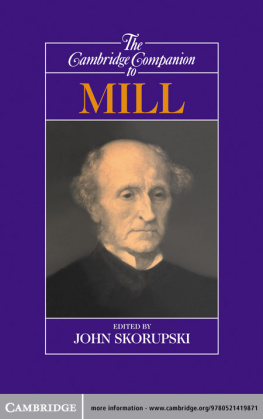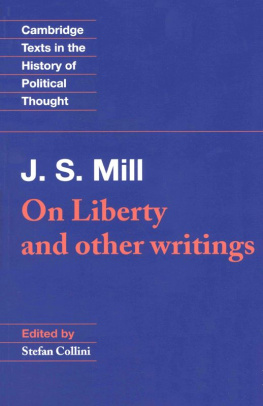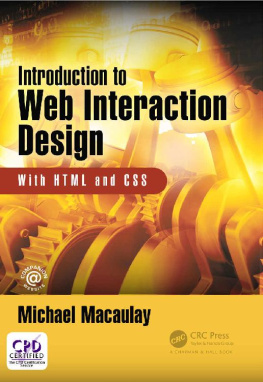Mill - Jurisprudence
Here you can read online Mill - Jurisprudence full text of the book (entire story) in english for free. Download pdf and epub, get meaning, cover and reviews about this ebook. publisher: Charles River Editors, genre: Science. Description of the work, (preface) as well as reviews are available. Best literature library LitArk.com created for fans of good reading and offers a wide selection of genres:
Romance novel
Science fiction
Adventure
Detective
Science
History
Home and family
Prose
Art
Politics
Computer
Non-fiction
Religion
Business
Children
Humor
Choose a favorite category and find really read worthwhile books. Enjoy immersion in the world of imagination, feel the emotions of the characters or learn something new for yourself, make an fascinating discovery.
Jurisprudence: summary, description and annotation
We offer to read an annotation, description, summary or preface (depends on what the author of the book "Jurisprudence" wrote himself). If you haven't found the necessary information about the book — write in the comments, we will try to find it.
Mill: author's other books
Who wrote Jurisprudence? Find out the surname, the name of the author of the book and a list of all author's works by series.
Jurisprudence — read online for free the complete book (whole text) full work
Below is the text of the book, divided by pages. System saving the place of the last page read, allows you to conveniently read the book "Jurisprudence" online for free, without having to search again every time where you left off. Put a bookmark, and you can go to the page where you finished reading at any time.
Font size:
Interval:
Bookmark:
THE END OF JURISPRUDENCE, VIZ. the Protection of Rights.Importance of the Inquiry, as involving Human Happiness.Confusion in the vulgar uses of the word Right.Use of the term Right, in the Science of Jurisprudence.The principal ideas involved in the Jurisprudential sense of the word Right.All Rights respect Objects desired; and desired as means to an end.The Objects of Rights are twofold, viz. either Persons or Things.Rights, when closely inspected, mean Powers legalized Powers.Powers over Persons, and Powers over Things.Every Right imports a corresponding Obligation.No Creation of Good, by Rights, without the Creation of Evil.
T HE object and end of the science which is distinguished by the name of Jurisprudence, is the protection of rights.
The business of the present discourse is, therefore, to ascertain the means which are best calculated for the attainment of that end.
What we desire to accomplish is, The protection of rights: What we have to inquire is, The means by which protection may be afforded.
That rights have hitherto been very ill protected, even in the most enlightened countries, is matter of universal acknowledgment and complaint. That men are susceptible of happiness, only in proportion as rights are protected, is a proposition, which, taken generally, it is unnecessary to prove. The importance of the inquiry, therefore, is evident.
It is requisite, as a preliminary, to fix, with some precision, what we denote by the expression rights. There is much confusion in the use of this term. That disorderly mass, the Roman law, changes the meaning of the word in stating its division of the subject, Jura Personarum, and Jura Rerum. In the first of these phrases, the word Jura means a title to enjoy; in the second, it must of necessity mean something else, because things cannot enjoy. Lawyers, whose nature it is to trudge, one after another, in the track which has been made for them, and to whose eyes, that which is, and that which ought to be, have seldom any mark of distinction, have translated the jargon into English, as well as into other modern languages.
This is not all the confusion which has been incurred in the use of the word right . It is sometimes employed in a very general way, to denote whatever ought to be; and in that sense is opposed to wrong. There are also personsbut these are philosophers, pushing on their abstractionswho go beyond the sense in which it is made to denote generally whatever ought to be, and who make it stand for the foundation of whatever ought to be. These philosophers say, that there is a right and a wrong, original, fundamental; and that things ought to be, or ought not to be, according as they do, or do not, conform to that standard. If asked, whence we derive a knowledge of this right and wrong in the abstract, which is the foundation and standard of what we call right and wrong in the concrete, they speak dogmatically, and convey no clear ideas. [1] In short, writers of this stamp give us to understand, that we must take this standard, like many other things which they have occasion for, upon their word. After all their explanations are given, this, we find, is what alone we are required, or rather commanded, to trust to. The standard exists,Why? Because they say it exists; and it is at our peril if we refuse to admit the assertion. They assume a right, like other despots, to inflict punishment, for contumacy, or contempt of court. To be sure, hard words are the only instruments of tyranny which they have it in their power to employ. They employ them, accordingly; and there is scarcely an epithet, calculated to denote a vicious state of the intellectual, or moral part, of the human mind, which they do not employ to excite an unfavourable opinion of those who refuse subscription to their articles of faith.
With right, however, in this acceptation, we have at present, no farther concern than to distinguish it clearly from that sense in which the word is employed in the science of jurisprudence. To conceive more exactly the sense in which it is employed in that science, it is necessary to revert to what we established, in the article Government , with regard to the end or object of the social union, for to that, every thing which is done in subservience to the social union, must of course bear a reference.
In that article it appeared, that, as every man desires to have for himself as many good things as possible, and as there is not a sufficiency of good things for all, the strong, if left to themselves, would take from the weak every thing, or at least as much as they pleased; that the weak, therefore, who are the greater number, have an interest in conspiring to protect themselves against the strong. It also appeared, that almost all the things, which man denominates good, are the fruit of human labour; and that the natural motive to labour is the enjoyment of its fruits.
That the object, then, of the social union, may be obtained; in other words, that the weak may not be deprived of their share of good things, it is necessary to fix, by some determination, what shall belong to each, and to make choice of certain marks by which the share of each may be distinguished. This is the origin of right. It is created by this sort of determination, which determination is either the act of the whole society, or of some part of the society which possesses the power of determining for the whole. Right, therefore, is factitious, and the creature of will. It exists, only because the society, or those who wield the powers of the society, will that it should exist; and before it was so willed, it had no existence.
It is easy to see what is the standard, in conformity with which the rights in question ought to be constituted; meaning by ought, that which perfect benevolence would desire. It is the greatest happiness of the greatest number. But whether rights are constituted, that is, whether the shares of good things are allotted to each, according to this standard, or not according to this standard, the allotment is still the act of the ruling power of the community; and the rights, about which the science of jurisprudence treats, have this alone for the cause of their existence.
In this complicated term, it is obvious that there is involved, on the one hand, the idea of the person to whom a share is allotted, and on the other hand, an idea of the things which are allotted. The one is the owner of the right, the person to whom it belongs; the other is the object of the right, namely, the person or thing over which certain powers are given.
All rights of course are rights to objects of human desire,of nothing else need shares be allotted. All objects which men desire, are desired, either as the end, or as means. The pleasurable state of the mind is the end; consisting of the feelings of the mind. It would be absurd, however, to speak of giving a man a right to the feelings of his own mind. The objects of desire, therefore, which are the objects of right, are not the pleasurable feelings themselves, which are desired as the end, but the objects which are desired as the means to that end.
Objects of desire, as means to that end, may be divided into the class of persons and the class of things. Both may be the object of rights. In framing our language, therefore, we may say, that all rights are the rights of persons; but they may be rights to, either persons, or things.
All that men desire, either with persons or things, is to render them subservient to the end, for which they are desired as means. They are so rendered by certain powers over them. All rights, then, when the term is closely investigated, are found to mean powers; powers with respect to persons, and powers with respect to things. What any one means when he says that a thing is his property, is, that he has the power of using it in a certain way.
Font size:
Interval:
Bookmark:
Similar books «Jurisprudence»
Look at similar books to Jurisprudence. We have selected literature similar in name and meaning in the hope of providing readers with more options to find new, interesting, not yet read works.
Discussion, reviews of the book Jurisprudence and just readers' own opinions. Leave your comments, write what you think about the work, its meaning or the main characters. Specify what exactly you liked and what you didn't like, and why you think so.

